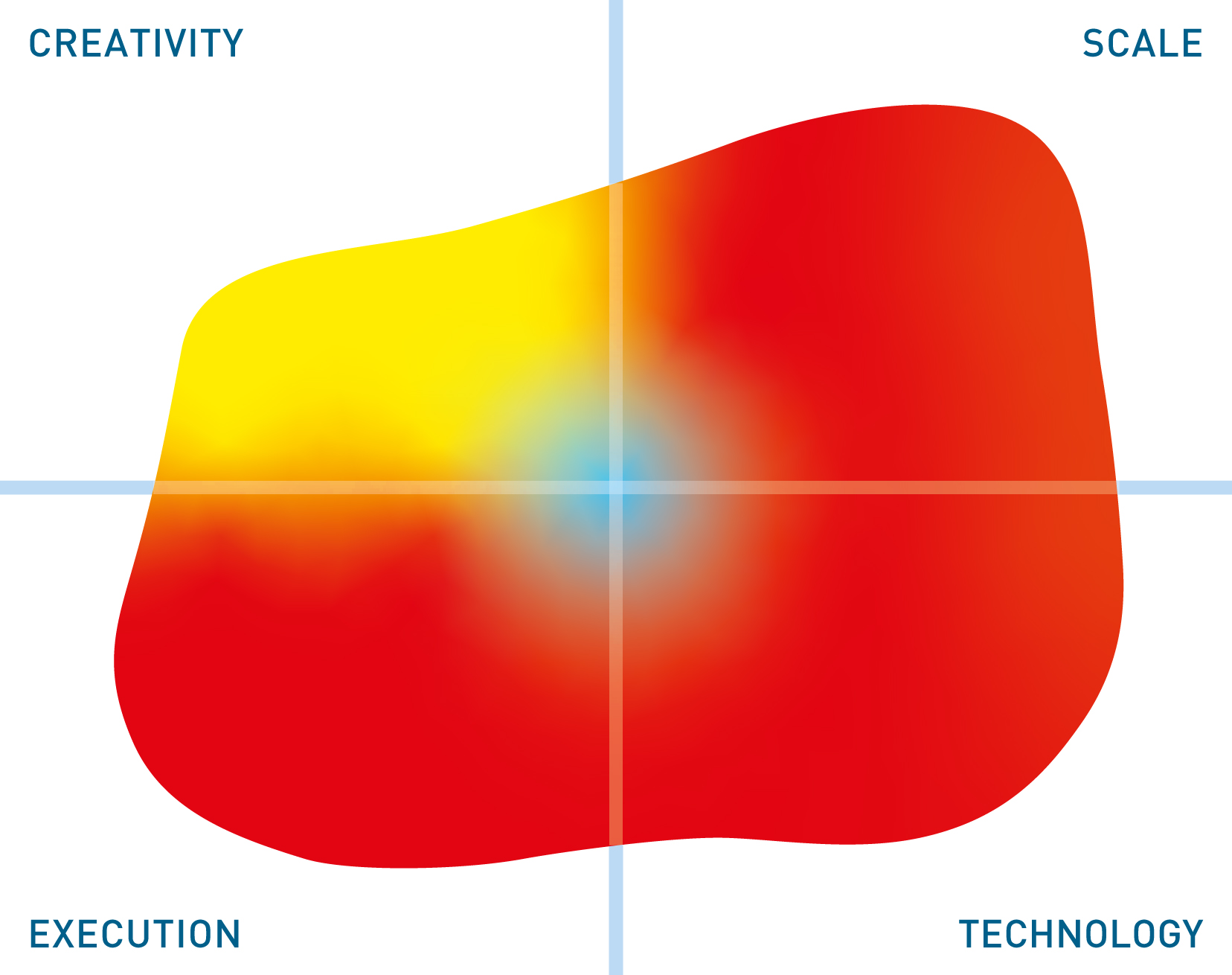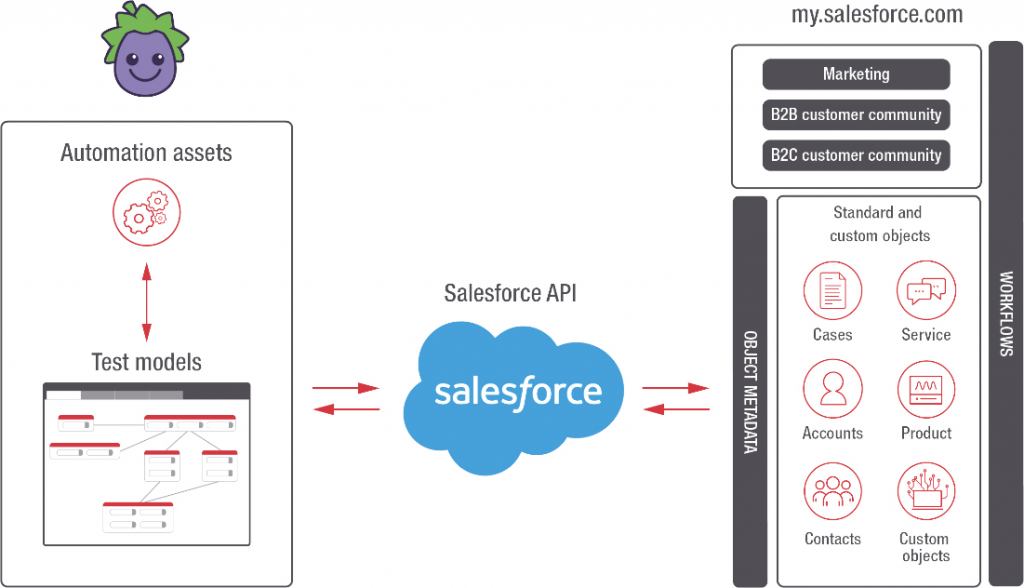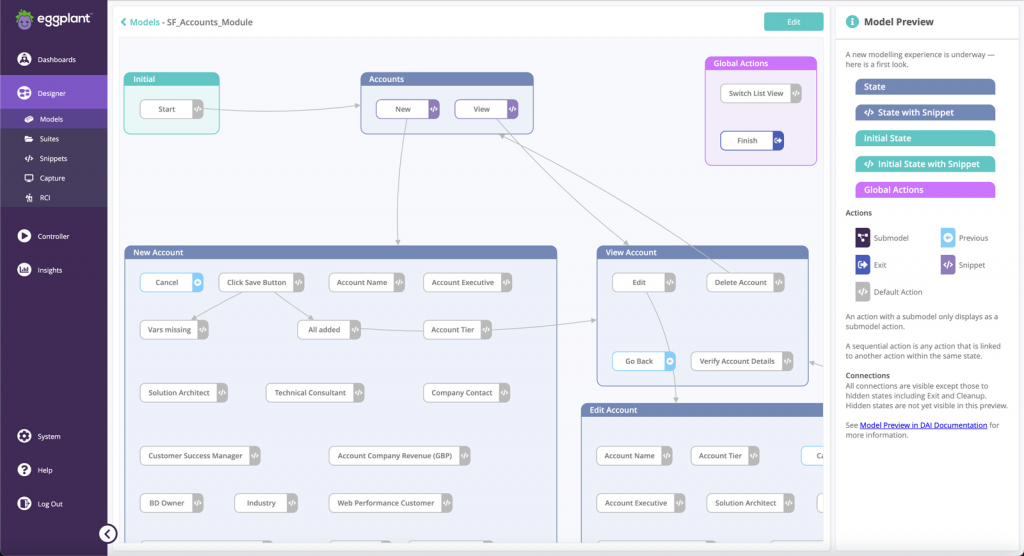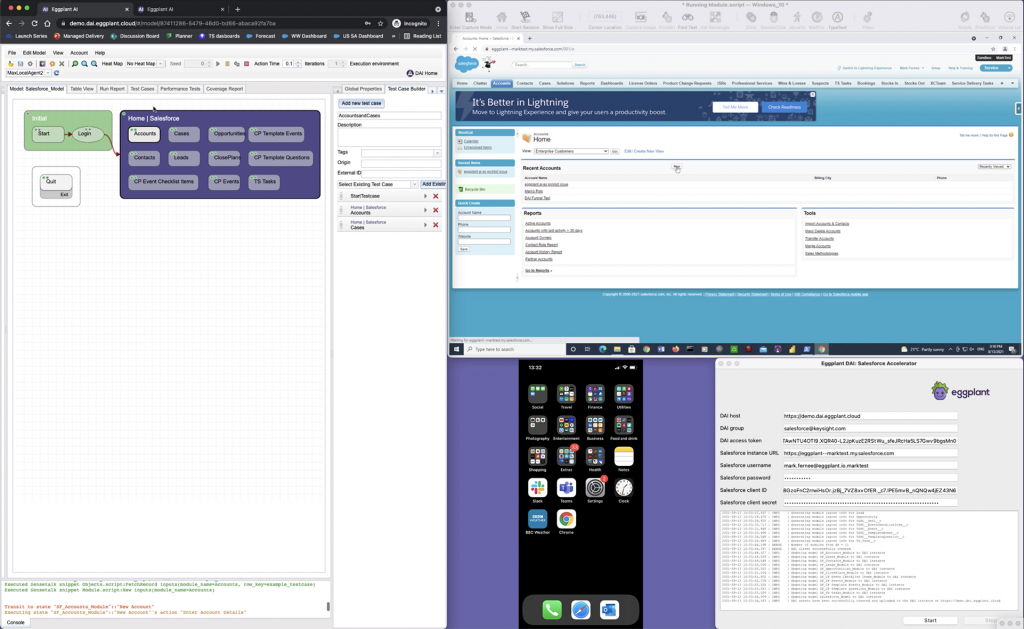Eggplant Salesforce Solution
Update solution on November 26, 2021

What is it?
Eggplant Digital Automation Intelligence (DAI) is a software automation platform that leverages AI and machine learning (ML) to create a digital twin model for functional, regression, and user experience testing across any device, browser, operating system, or platform. This typically includes automating all major aspects of your testing within your CI/CD pipeline, stretching from low-level test execution all the way up to high-level test design. AI and ML are used to automatically generate maximum test coverage with a testing approach that always focuses on the end user. DAI also contains metrics for measuring and analysing release quality, including predictors of success for upcoming releases.

The Eggplant Salesforce Solution augments Eggplant DAI in order to provide an out-of-the-box solution that is tailor-made for accelerating the testing of Salesforce applications and releases. The goal is to intelligently automate your Salesforce testing, reduce release times, increase test coverage and so on. As with Eggplant DAI, this is largely accomplished through model-based testing built around an AI-driven digital twin, a Universal Fusion Engine for executing your test cases against any device, and robust test and release monitoring capabilities. The difference is that this solution has specific functionality to address common pain points found when testing applications in a Salesforce context. It thereby helps you to effectively test Salesforce SaaS application environments and enable faster delivery of new Salesforce capabilities without compromising on quality.
What does it do?
In Eggplant DAI, you build a graphical model of your application, interface or website (your ‘system under test’, or SUT), which you can then use to automatically generate exploratory test cases, test scripts, and code snippets. This build process can be automated, and AI is used to maximise coverage during test case creation. Risk-based testing is also available – again driven by AI – in order to prioritise particularly critical tests and identify, then repeat, common patterns found within failing tests until they no longer consistently fail.

Test cases generated by Eggplant are, as a rule, fully executable, and the suite’s Universal AI Fusion Engine means that they can be executed against any system, non-intrusively and without modifying your testing assets. Performance testing is also available, and in fact, Eggplant DAI models can be used to automatically create performance tests.
Eggplant Salesforce Solution builds on this foundation in order to create a testing solution tailored to Salesforce in particular. This means that it can examine your Salesforce environment, its metadata, and the applications therein, then use what it finds there to automatically build your Eggplant testing model, and from there the rest of your testing assets. This includes capturing any business rules implemented within or other customisations made to your Salesforce environment, that will in turn be taken into account and incorporated into your model. Third-party offerings available through Salesforce (for instance, via the Salesforce AppExchange) are also compatible, enabling your testing model to be highly encompassing and holistic.
Why should you care?
Eggplant DAI’s general advantages – extensive auto-generation of test scripts, AI-driven exploratory testing, and user experience-focused test automation capabilities, for instance – are highly applicable to the efficient testing of Salesforce environments. The Eggplant Salesforce Solution doubles down on these advantages while also introducing specific capabilities to address Salesforce’s unique foibles. For instance, Salesforce’s three mandatory releases per year is a common pain point that Eggplant addresses by marrying its testing model creation and test automation facilities to your Salesforce environment, and thereby providing the speed and automation necessary to allow you to create, update and execute your tests in good time prior to each such release.

For a second example, consider that there are two versions of Salesforce available: Salesforce Classic and Salesforce Lightning. Although the latter provides a more modern UI, both are widely used, and it is not unusual to, for example, switch to Salesforce Lightning and build apps in that while also having some older Salesforce Classic apps still kicking around and providing value (rather a lot of it, in some cases). Unfortunately, this can cause problems for your testing, because now you have two different application UI architectures living in the same Salesforce system. Thus, you will likely end up with two distinct, incompatible sets of test suites for it, neither capable of covering the whole environment and likely featuring a lot of repetition. It should go without saying that this is highly inefficient. The Eggplant Salesforce Solution addresses this issue by allowing you to leverage a common set of tests across both Classic and Lightning instances that can all be created from your singular Eggplant model. In short, it lets you test both Classic and Lightning apps interchangeably, without worrying overmuch about the implementation details of which kind of app each test will need to be run on.
The Bottom Line
Eggplant’s recent focus on enterprise applications stands to benefit greatly from platform-specific offerings, like Eggplant Salesforce Solution, that enable it to apply its AI test automation facilities to highly complex, large-scale enterprise SaaS application platforms, such as Salesforce, as easily and effectively as possible.
Related Company
Connect with Us
Ready to Get Started
Learn how Bloor Research can support your organization’s journey toward a smarter, more secure future."
Connect with us Join Our Community
